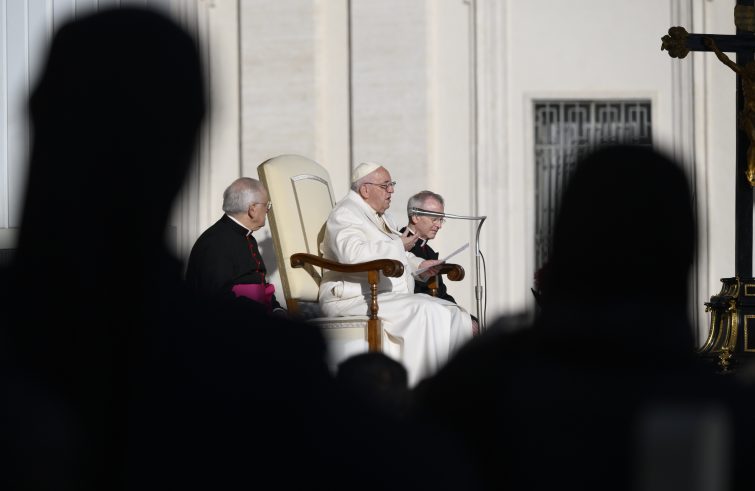
“May the intercession of the Holy Brother Apostles Peter and Andrew grant the Church the enjoyment of her full unity and may peace spread throughout the world, and at this time to the beloved, tormented Ukraine in particular, always in our hearts and in our prayers.” These were the concluding words of the Wednesday general audience in Saint Peter’s Square, at the end of which the Pope applauded several times an unscheduled performance in the Vatican square by the ‘Black Blues Brothers’, five circus artists from Kenya. To learn to recognise true consolation, an important element of “good” discernment, “so as not to be deceived in the search for our true good”, at the centre of the Pope’s catechesis. “Here is true consolation – the Pope said – but there are also consolations that are not true”, as we are told by Saint Ignatious of Loyola: “If it leads me to something wrong, that is not good, the consolation is not true, it is ‘fake’, let’s say. For example, “I have the thought of praying, and I note that it accompanies affection towards the Lord and neighbour, it invites gestures of generosity, of charity: it is a good beginning. It can instead happen that such a thought emerges to avoid a job or task that has been entrusted to me: every time I have to wash the dishes or clean the house, I have a strong urge to pray!” “This happens, in convents”, the Pope added in unscripted remarks.
Consolation is “not is to feel like a peacock in front of God”:
“If I begin to pray and, like the pharisee in the parable, I tend to be self-satisfied and to disdain others, perhaps with a resentful and sour spirit, then these are signs that the evil spirit has used that thought as a key to enter into my heart and to transmit his feelings to me”, Francis said with regard to true and false consolation. “For instance, it can happen that I work hard for a good and worthy task, but this pushes me to stop praying, because I am busy with many things; I find I am increasingly aggressive and angry, I feel that everything depends on me, to the point of losing confidence in God.” “Here, evidently, there is the action of the evil spirit”, the Pope said, exhorting the faithful to “examine well the path of our sentiments.”
“The style of the enemy – when we speak about the enemy, we speak about the devil, because the devil exists, he is there! – his style, we know – is to present himself in a devious, masked way: he starts from what is most dear to us and then, little by little, reels us in: evil enters secretly, without the person being aware of it. And with time, gentleness becomes hardness: that thought reveals itself for what it truly is.”
It’s the parable of false consolation: hence the importance “of this patient but indispensable examination of the origin and the truth of our thoughts; it is an invitation to learn from experiences, from what happens to us, so as not to continue to repeat the same errors.”
“The more we know ourselves, the more we sense where the evil spirit enters, his “password”,
the entrance to our heart, which are the points to which we are most sensitive, so as to pay attention to them in the future”, Francis remarked. “Each one of us has their more sensitive spots, the weak spots in their personality”, the Pope went on to explain: “and the evil spirit enters there, and leads us down the wrong path, or takes us away from the true, right path.” That is why a daily examination of conscience is so important:
“Before ending the day, stop a moment. What happened? Not in the newspapers, not in life: what happened in my heart?
It is the valuable effort of rereading experience from a particular point of view. Noticing what happens is important, it is a sign that God’s grace is working in us, helping us to grow in freedom and awareness. We are not alone: the Holy Spirit is with us.” “Genuine consolation – Francis explained – is a sort of confirmation that we are doing what God wants of us, that we are walking on his paths, that is, on the paths of life, joy, and peace. Discernment, in fact, is not simply about what is good or the greatest possible good, but about what is good for me here and now: this is what I am called to grow on, setting limits to other proposals, attractive but unreal, so as not to be deceived in the search for the true good.” For Francis, it is necessary “to go ahead in understanding what happens in my heart”: “And this is why – he concluded, in unscripted remarks – an examination of conscience is necessary, to see what happened today. To look for the root of these mistakes. Learning to read what happened during the day in the book of our heart. Do it: it will take just two minutes, but it will do you good, I assure you.!”.












